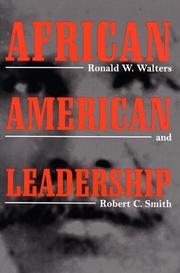| Listing 1 - 7 of 7 |
Sort by
|

ISBN: 0585091048 9780585091044 0791441458 0791441466 1438423209 Year: 1999 Publisher: Albany : State University of New York Press,
Abstract | Keywords | Export | Availability | Bookmark
 Loading...
Loading...Choose an application
- Reference Manager
- EndNote
- RefWorks (Direct export to RefWorks)
African American leadership. --- African American clergy. --- African American politicians. --- African Americans --- Afro-American politicians --- Politicians, African American --- Politicians --- Afro-American clergy --- Clergy, African American --- Negro clergy --- Clergy --- Afro-American leadership --- Leadership, African American --- Negro leadership --- Leadership --- Politics and government.
Book
ISBN: 1283411717 9786613411716 1572338407 9781572338401 9781572338265 1572338261 661341171X 9781283411714 Year: 2011 Publisher: Knoxville University of Tennessee Press
Abstract | Keywords | Export | Availability | Bookmark
 Loading...
Loading...Choose an application
- Reference Manager
- EndNote
- RefWorks (Direct export to RefWorks)
Press, Platform, Pulpit examines how early black feminism goes public by sheding new light on some of the major figures of early black feminism as well as bringing forward some lesser-known individuals who helped shape various reform movements. With a perspective unlike many other studies of black feminism, Teresa Zackodnik considers these activists as central, rather than marginal, to the politics of their day, and argues that black feminism reached critical mass well before the club movement's national federation at the turn into the twentieth century . Throughout, she s
African American clergy --- African American social reformers --- African American feminists --- Feminism --- Afro-American clergy --- Clergy, African American --- Negro clergy --- Clergy --- Social reformers, African American --- Social reformers --- Feminists, African American --- Feminists --- History

ISBN: 0203616634 1299478476 1136061703 9781136061707 9780203616635 9780203616635 9781136061868 113606186X 9781136061783 1136061789 0415933269 9780415933261 0415933277 9780415933278 9781299478473 Year: 2002 Publisher: New York Routledge
Abstract | Keywords | Export | Availability | Bookmark
 Loading...
Loading...Choose an application
- Reference Manager
- EndNote
- RefWorks (Direct export to RefWorks)
Clarence Taylor shows how black leaders were able to carve out a space for religion as part of a progressive political agenda and reveals the complex and innovative ways that black religious notions were continually reconstructed to accommodate the communities they served.
African American clergy --- African American intellectuals --- African American leadership. --- African Americans --- Afro-American clergy --- Clergy, African American --- Negro clergy --- Clergy --- Afro-American leadership --- Leadership, African American --- Negro leadership --- Leadership --- Political activity. --- Civil rights. --- Religion.
Book
ISBN: 0674043111 9780674043114 9780674031777 0674031776 0674267036 9780674267039 Year: 2012 Publisher: Cambridge, MA
Abstract | Keywords | Export | Availability | Bookmark
 Loading...
Loading...Choose an application
- Reference Manager
- EndNote
- RefWorks (Direct export to RefWorks)
Even before the emergence of the civil rights movement, African American religion and progressive politics were assumed to be inextricably intertwined. Savage counters this assumption with the story of a highly diversified religious community whose debates over engagement in the struggle for racial equality were as vigorous as they were persistent.
African American churches --- African American clergy --- African Americans --- Civil rights movements --- Christianity and politics --- Afro-American clergy --- Clergy, African American --- Negro clergy --- Clergy --- Afro-American churches --- Black churches --- Churches, African American --- Negro churches --- Christian sects --- Political activity. --- Politics and government --- History --- Religion
Book
ISBN: 0814768253 9780814768259 9780814768761 0814768768 9780814768235 0814768237 9780814768242 0814768245 Year: 2012 Publisher: New York : New York University Press,
Abstract | Keywords | Export | Availability | Bookmark
 Loading...
Loading...Choose an application
- Reference Manager
- EndNote
- RefWorks (Direct export to RefWorks)
One of the unique aspects of the religious profession is the high percentage of those who claim to be “called by God” to do their work. This call is particularly important within African American Christian traditions. Divine Callings offers a rare sociological examination of this markedly understudied phenomenon within black ministry. Richard N. Pitt draws on over 100 in-depth interviews with Black Pentecostal ministers in the Church of God in Christ—both those ordained and licensed and those aspiring—to examine how these men and women experience and pursue “the call.” Viewing divine calling as much as a social process as it is a spiritual one, Pitt delves into the personal stories of these individuals to explore their work as active agents in the process of fulfilling their calling. In some cases, those called cannot find pastoral work due to gender discrimination, lack of clergy positions, and educational deficiencies. Pitt looks specifically at how those who have not obtained clergy positions understand their call, exploring the influences of psychological experience, the congregational acceptance of their call, and their response to the training process. He emphasizes how those called reconceptualize clericalism in terms of who can be called, how that call has to be certified, and what those called are meant to do, offering insight into how social actors adjust to structural constraints.
Vocation, Ecclesiastical. --- African American clergy. --- Ecclesiastical vocation --- Vocations, Ecclesiastical --- Afro-American clergy --- Clergy, African American --- Negro clergy --- Clergy --- Church of God in Christ --- COGIC --- Appointment, call, and election. --- the Church of God in Christ --- Pentecostal history --- doctrine --- polity --- calling narratives --- black Pentecostals --- educational credentialing --- religious work --- women's clerical identity --- ministry --- clergy --- sociology of religion --- black Pentecostalism
Book
ISBN: 1282166387 9786613809452 1611171741 9781611171747 1611171407 9781570039805 1570039801 9781611171402 Year: 2011 Publisher: Columbia University of South Carolina Press
Abstract | Keywords | Export | Availability | Bookmark
 Loading...
Loading...Choose an application
- Reference Manager
- EndNote
- RefWorks (Direct export to RefWorks)
"Though De Laine and the brave parents who filed Briggs v. Elliott initially lost their lawsuit in district court, the case grew in significance when the plaintiffs appealed the decision to the U.S. Supreme Court. Three years after the appeal, the Briggs case was one of the five lawsuits that shared the historic Brown decision. However, the ruling did not prevent De Laine and his family from suffering vicious reprisals from vindictive white citizens. In 1955, after he was shot at and his church was burned to the ground, De Laine prudently fled South Carolina in order to save his life. He died in exile in Charlotte, North Carolina, in 1974. Fifty years after the Supreme Court's decision, De Laine was awarded the Congressional Gold Medal in recognition of his role in reshaping the American civil rights landscape."--Book jacket.
African American civil rights workers --- African American clergy --- Civil rights movements --- African Americans --- Segregation in education --- Afro-American civil rights workers --- Civil rights workers, African American --- Civil rights workers --- Afro-American clergy --- Clergy, African American --- Negro clergy --- Clergy --- Civil liberation movements --- Liberation movements (Civil rights) --- Protest movements (Civil rights) --- Human rights movements --- Afro-Americans --- Black Americans --- Colored people (United States) --- Negroes --- Africans --- Ethnology --- Blacks --- Education --- School segregation --- Discrimination in education --- Race relations in school management --- School integration --- History --- Civil rights --- Law and legislation --- Segregation --- DeLaine, Joseph A. --- Elliott, R. W. --- Briggs, Harry, --- Black people --- De Laine, Joseph Armstrong, --- DeLaine, Joseph Armstrong,
Book
ISBN: 1935978950 1935978624 1935978608 1935978616 9781935978954 9781935978619 9781935978602 9781935978626 Year: 2013 Publisher: Morgantown
Abstract | Keywords | Export | Availability | Bookmark
 Loading...
Loading...Choose an application
- Reference Manager
- EndNote
- RefWorks (Direct export to RefWorks)
African American clergy --- Turner, Henry McNeal, --- United States. --- African Methodist Episcopal Church --- Chaplains --- Clergy --- African American troops --- History --- United States --- Virginia --- Chaplains. --- Participation, African American. --- Campaigns. --- Afro-American clergy --- Clergy, African American --- Negro clergy --- Turner, H. M. --- U.S. Army --- US Army --- A.M.E. Church --- AME Church --- A.M.E. --- AME --- A.M.E. (Bethel) Church --- AMEC --- British Methodist Episcopal Church --- ABŞ --- ABSh --- Ameerika Ühendriigid --- America (Republic) --- Amerika Birlăshmish Shtatlary --- Amerika Birlăşmi Ştatları --- Amerika Birlăşmiş Ştatları --- Amerika ka Kelenyalen Jamanaw --- Amerika Qūrama Shtattary --- Amerika Qŭshma Shtatlari --- Amerika Qushma Shtattary --- Amerika (Republic) --- Amerikai Egyesült Államok --- Amerikanʹ Veĭtʹsėndi︠a︡vks Shtattnė --- Amerikări Pĕrleshu̇llĕ Shtatsem --- Amerikas Forenede Stater --- Amerikayi Miatsʻyal Nahangner --- Ameriketako Estatu Batuak --- Amirika Carékat --- AQSh --- Ar. ha-B. --- Arhab --- Artsot ha-Berit --- Artzois Ha'bris --- Bí-kok --- Ē.P.A. --- EE.UU. --- Egyesült Államok --- ĒPA --- Estados Unidos --- Estados Unidos da América do Norte --- Estados Unidos de América --- Estaos Xuníos --- Estaos Xuníos d'América --- Estatos Unitos --- Estatos Unitos d'America --- Estats Units d'Amèrica --- Ètats-Unis d'Amèrica --- États-Unis d'Amérique --- Fareyniḳṭe Shṭaṭn --- Feriene Steaten --- Feriene Steaten fan Amearika --- Forente stater --- FS --- Hēnomenai Politeiai Amerikēs --- Hēnōmenes Politeies tēs Amerikēs --- Hiwsisayin Amerikayi Miatsʻeal Tērutʻiwnkʻ --- Istadus Unidus --- Jungtinės Amerikos valstybės --- Mei guo --- Mei-kuo --- Meiguo --- Mî-koet --- Miatsʻyal Nahangner --- Miguk --- Na Stàitean Aonaichte --- NSA --- S.U.A. --- SAD --- Saharat ʻAmērikā --- SASht --- Severo-Amerikanskie Shtaty --- Severo-Amerikanskie Soedinennye Shtaty --- Si︠e︡vero-Amerikanskīe Soedinennye Shtaty --- Sjedinjene Američke Države --- Soedinennye Shtaty Ameriki --- Soedinennye Shtaty Severnoĭ Ameriki --- Soedinennye Shtaty Si︠e︡vernoĭ Ameriki --- Spojené obce severoamerické --- Spojené staty americké --- SShA --- Stadoù-Unanet Amerika --- Stáit Aontaithe Mheiriceá --- Stany Zjednoczone --- Stati Uniti --- Stati Uniti d'America --- Stâts Unîts --- Stâts Unîts di Americhe --- Steatyn Unnaneysit --- Steatyn Unnaneysit America --- SUA (Stati Uniti d'America) --- Sŭedineni amerikanski shtati --- Sŭedinenite shtati --- Tetã peteĩ reko Amérikagua --- U.S. --- U.S.A. --- United States of America --- Unol Daleithiau --- Unol Daleithiau America --- Unuiĝintaj Ŝtatoj de Ameriko --- US --- USA --- Usono --- Vaeinigte Staatn --- Vaeinigte Staatn vo Amerika --- Vereinigte Staaten --- Vereinigte Staaten von Amerika --- Verenigde State van Amerika --- Verenigde Staten --- VS --- VSA --- Wááshindoon Bikéyah Ałhidadiidzooígíí --- Wilāyāt al-Muttaḥidah --- Wilāyāt al-Muttaḥidah al-Amirīkīyah --- Wilāyāt al-Muttaḥidah al-Amrīkīyah --- Yhdysvallat --- Yunaeted Stet --- Yunaeted Stet blong Amerika --- ZDA --- Združene države Amerike --- Zʹi︠e︡dnani Derz︠h︡avy Ameryky --- Zjadnośone staty Ameriki --- Zluchanyi︠a︡ Shtaty Ameryki --- Zlucheni Derz︠h︡avy --- ZSA --- Η.Π.Α. --- Ηνωμένες Πολιτείες της Αμερικής --- Америка (Republic) --- Американь Вейтьсэндявкс Штаттнэ --- Америкӑри Пӗрлешӳллӗ Штатсем --- САЩ --- Съединените щати --- Злучаныя Штаты Амерыкі --- ولايات المتحدة --- ولايات المتّحدة الأمريكيّة --- ولايات المتحدة الامريكية --- 미국 --- États-Unis --- É.-U. --- ÉU
| Listing 1 - 7 of 7 |
Sort by
|

 Search
Search Feedback
Feedback About UniCat
About UniCat  Help
Help News
News